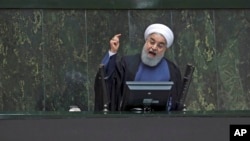Iran’s efforts to influence internet users around the world are larger than experts have thought, reports Reuters news agency.
Reuters said that Iran has a group of anonymous websites and social media accounts in 11 important languages.
Facebook and other companies said last week that social media accounts and websites were part of an Iranian campaign. The goal was to influence public opinion in other countries.
Reuters studied 10 other websites and many accounts on Facebook, Instagram, Twitter and YouTube.
The American internet security company FireEye and the Israeli company ClearSky studied Reuters’s research. The companies said that technical evidence showed a web of sites and social media accounts called the International Union of Virtual Media, or IUVM.
Facebook, Twitter and Alphabet, the parent company of Google, took down some sites and accounts linked to IUVM last week.
IUVM spreads information from Iranian state media and other media providers supportive of Iranian policies on the internet. Often the provider makes it difficult to find out where the information first came from. Some of these media providers include Iran’s PressTV, FARS news agency and al-Manar TV, which is linked to the pro-Iranian militant group Hezobollah in Lebanon. Representatives from those media companies or the Iranian government did not answer Reuters’ requests for comments.
Russia not alone in trying to influence elections
Since 2016, U.S. officials and media have been looking into possible Russian interference into the presidential election that year.
In July, a grand jury in the United States brought charges against 12 Russians. They were accused of being intelligence officers trying to hack computer systems of political groups in 2016. Russia has denied the charges.
U.S. officials also have warned that Russia could attempt to influence congressional elections in November.
Ben Nimmo is with the Digital Forensic Research Lab at the Atlantic Council in Washington D.C. He said the Iranian operation was a large-scale one.
“This shows how easy it is to run an influence operation online, even when the level of skill is low.”
He said the Iranian operation depended on quantity not quality but still stayed secret for years.
Facebook spokesman Jay Nancarrow said the company is continuing to investigate accounts and pages linked to Iran. The company, he said, took down more pages on Tuesday.
Twitter tweeted that it had removed 486 accounts for violating its terms of use since last week. Twitter said it had suspended 770 accounts recently and of those “fewer than 100” had been based in the U.S.
YouTube blocked the IUVM TV page after Reuters contacted the company with questions about it.
Reuters has sought comments from IUVM, but has not received answers from the company. However, the company does not hide that it supports Iranian causes.
IUVM operates in languages including English, French, Arabic, Farsi, Urdu, Pashto, Russian, Turkish and Spanish.
I’m Mario Ritter.
Reuters reported this story for VOA News. Mario Ritter adapted it for VOA Learning English. Caty Weaver was the editor.
_____________________________________________________________
Words in This Story
anonymous –adj. not named or identified
hack –v. to secretly get access to the files on a computer or network in order to get information or cause damage
scale –n. the size or level of something
We want to hear from you. Write to us in the Comments section, and visit our Facebook page.







